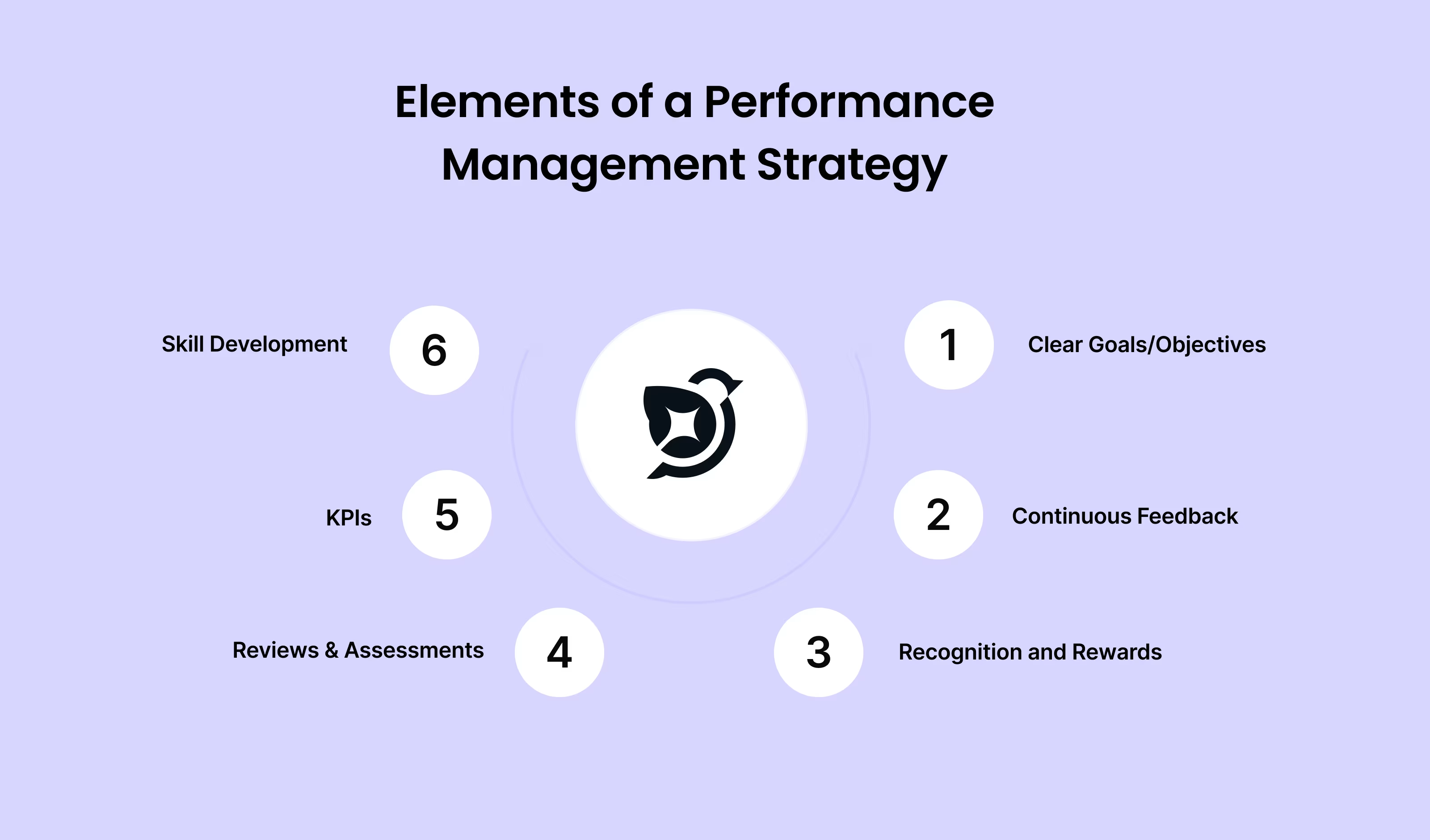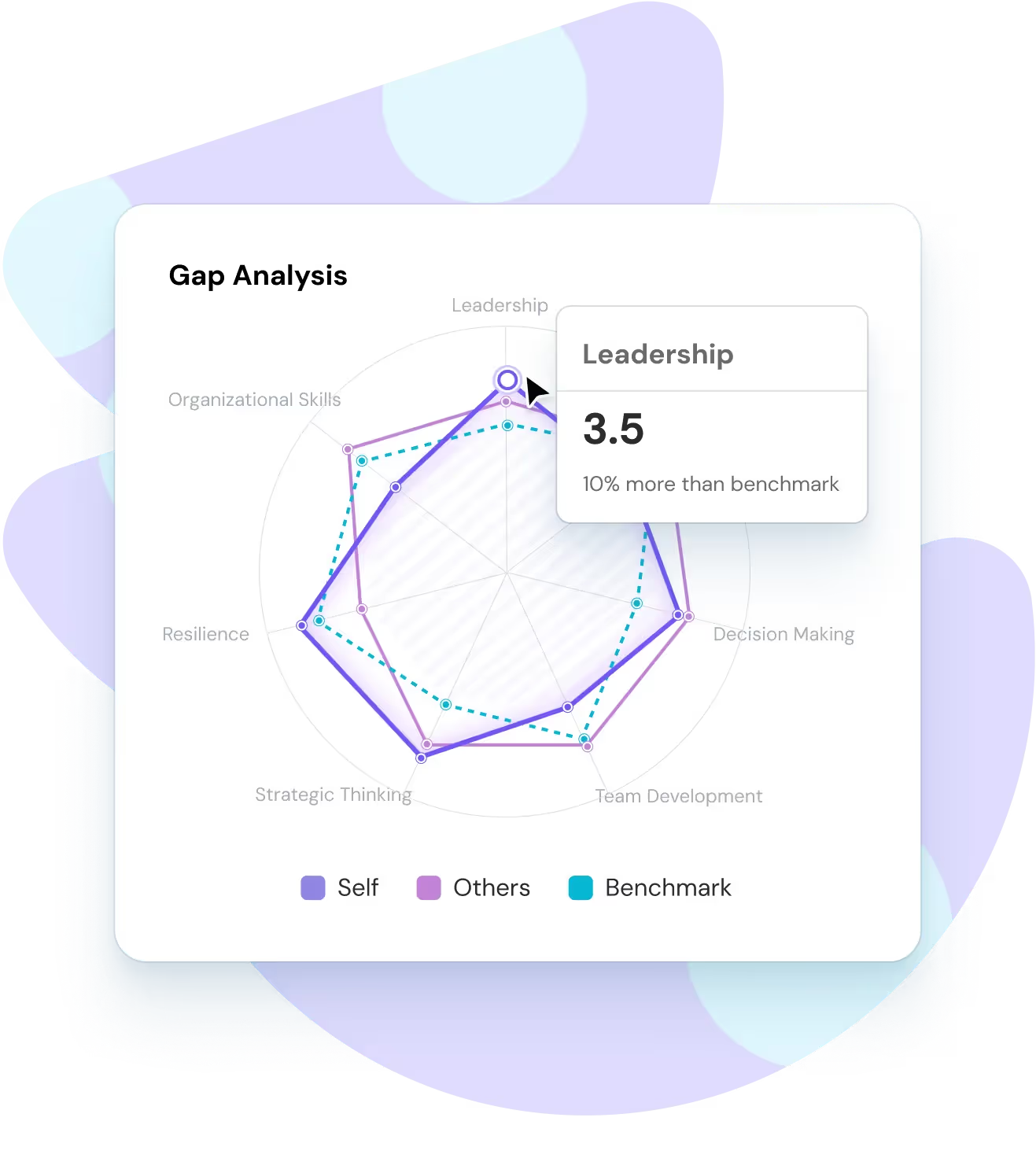Effective performance management is the cornerstone of organizational success. Yet, over half of companies feel their current performance management systems don’t fully leverage employee potential. [Emptrack]
It is likely due to lack of a strategic and continuous approach to managing and developing employee performance; one that aligns individual goals with broader company objectives, fosters open communication, and inspires ongoing growth. This is what separates thriving organizations from the rest.
So let's go over 12 proven performance management strategies that is sure to help you build and sustain high-performing teams.
The Importance of a Performance Management Strategy
A strong performance management strategy is a long-term growth engine for your people and your business. It improves how teams work, how decisions are made, and how future leaders are developed. Here’s why it matters:
a. Enhances employee engagement
When employees understand what’s expected of them and how their work contributes to the organization’s goals, their engagement rises. Clear expectations and ongoing feedback create a sense of purpose and ownership. [source: McKinsey]
b. Improves organizational performance
Companies that take a people-first approach to performance management are significantly more likely to outperform peers in revenue growth and productivity. [source: McKinsey]
c. Creates better career development opportunities
A structured performance strategy identifies skill gaps, maps development paths, and ensures employees have the guidance they need to grow. This turns reviews into a forward-looking process rather than a backward-looking assessment.
d. Strengthens talent retention
When employees feel supported, recognized, and fairly evaluated, they’re far more likely to stay. Effective performance management reduces frustration and attrition by giving people clarity and a sense of progress.
e. Informs better decision-making
Performance data helps leaders make more objective decisions on promotions, compensation, team restructuring, and resource allocation. It replaces guesswork with insights.
f. Supports succession planning
A well-run performance system highlights high-potential employees, future leaders, and skill readiness. This helps organizations plan ahead, build bench strength, and avoid leadership gaps.
Key Elements of a Performance Management Strategy
Crafting an effective performance management strategy is essential for turning organizational goals into measurable results and engaged, high-performing teams. Below are the foundational elements that work together to create a cycle of continuous improvement and motivation:

1. Setting Clear Goals and Objectives
A strong strategy begins by establishing well-defined goals and objectives. These provide direction and set expectations, ensuring everyone understands what success looks like—both for individuals and for teams. Clear goals align individual effort with broader organizational aims and make progress trackable.
2. Continuous Feedback
Feedback shouldn’t wait for annual reviews.
Frequent, constructive feedback enables employees to learn, adjust quickly, and stay aligned. Open, ongoing conversations clarify expectations, address challenges in real time, and build a culture of trust and growth.
3. Employee Recognition and Rewards
Timely acknowledgment of achievements motivates employees and reinforces desired behaviors.
Recognition—whether through praise, incentives, or formal awards—boosts morale, fosters engagement, and encourages a sense of belonging. Rewards help cultivate a culture in which employees strive for and celebrate excellence.
4. Performance Reviews and Assessments
Structured reviews offer opportunities to formally evaluate achievements, strengths, and areas for development. Assessments provide a documented basis for decision-making on promotions, compensation, and development plans—all while helping employees set their sights on future objectives.
5. Key Performance Indicators (KPIs)
KPIs translate strategic goals into measurable outcomes.
By defining and monitoring KPIs (a set of tasks) for each individual , organizations can objectively assess progress, identify trends, and ensure accountability.
KPIs also make it easier to spot hurdles or high performers, so adjustments can be made to stay on course.
6. Skill Development
Ongoing development is essential for individual and organizational growth.
Investing in training, mentorship, and upskilling opportunities not only bridges skills gaps but also keeps employees engaged and future-ready. A focus on learning demonstrates commitment to career progression and keeps the workforce agile as business needs evolve.
A robust performance management strategy thoughtfully integrates these elements, creating a dynamic system that drives productivity, empowers employees, and sustains long-term organizational success.
Top 12 Strategies to Build and Sustain High-Performing Teams
The first step in building a high performance team is to manage their performance. In order for you to do that, you'll have to understand their workforce better and ensure they perform to their fullest.
#1 Identify the Factors Affecting Performance
Before you can build a high-performing team, you first need to understand what drives or hinders employee performance. Performance doesn’t exist in isolation—it’s shaped by multiple factors across the individual, team, and organizational levels.
Here are a few key factors that impact employee performance:
- Clarity of Goals and Expectations: When employees understand what’s expected of them, they can focus their efforts and align with company objectives.
- Recognition and Motivation: A lack of appreciation can quickly lead to disengagement. Recognizing contributions boosts morale and productivity.
- Leadership and Guidance: Managers play a vital role in performance. Supportive, communicative leaders inspire confidence and accountability.
- Learning and Growth Opportunities: Employees who have access to development paths are more motivated to perform at their best.
- Work Environment and Tools: The right systems, technologies, and resources reduce friction and help people perform efficiently.
- Feedback and Communication: Continuous feedback helps employees refine their work, correct course early, and stay aligned with team goals.
Knowing these factors helps you design targeted strategies that bring out their best potential and ensure consistent growth.

#2 Prioritize Growth and Development
Cultivating a high-performing team begins with a genuine investment in every member’s growth. Offer diverse learning opportunities—such as targeted training programs, interactive workshops, and tailored advancement pathways—to keep your team adaptable, skilled, and ready to meet new challenges. This proactive commitment signals that you value their potential and future, building both trust and loyalty.
The secret is strategic alignment: connect individual development initiatives directly to both personal aspirations and your organization’s goals. When employees see their learning journey tied to meaningful outcomes, they become more engaged and motivated. A continuous learning culture doesn’t just boost morale—it empowers your workforce to confidently tackle evolving demands, innovate, and drive business success.
Key Characteristics of High-Performing Teams
High-performing teams consistently deliver exceptional results and foster a workplace environment where each member can thrive. Here are five essential characteristics that set these teams apart—traits you can identify and encourage throughout your organization:
1. Effective Communication & Collaboration
High-performing teams excel at clear, honest, and open communication. They freely share information, offer constructive feedback, and work seamlessly together toward shared objectives.
2. Strong Leadership & Accountability
These teams have leaders who set clear goals, provide direction, and lead by example. Every member understands their responsibilities, holds themselves accountable, and takes ownership of both successes and setbacks.
3. Mutual Support & Recognition
Team members actively support one another, generously sharing knowledge and expertise. They recognize individual and group achievements, building a positive atmosphere that celebrates collective wins.
4. Commitment to Growth
Continuous learning is a priority. High-performing teams seek new skills, adapt quickly to challenges, and embrace feedback to keep improving—personally and together.
5. Inspirational Leadership
Leaders inspire and motivate the team, aligning everyone’s efforts with the organization’s vision and goals, and cultivating a sense of shared purpose.
How to Spot High-Performing Teams?
Look for groups where communication flows easily, accountability is shared, team members lift each other up, and there’s a visible drive for growth and improvement. Consistently strong, collaborative results and a team culture marked by trust and enthusiasm are hallmark signs of high performance.
Impact on the Organization
High-performing teams consistently exceed expectations, contributing significantly to the organization's success. Their adaptability, innovative approach, and cooperative spirit make them pivotal in driving forward company objectives.
In essence, high-performing teams blend clear goals, effective communication, diverse capabilities, collaborative spirit, a drive for development, and strong leadership to create a dynamic force that propels the organization towards its ambitions.
#3 Reward and Recognize Your Employees
Building a winning team is all about recognizing rockstar efforts! A strong performance management plan includes rewarding and acknowledging great work. A simple "thank you" for a job well done goes a long way. It shows you appreciate their hard work, encourages them to keep at it, and sets a positive tone for the team.

When someone gets recognized for their achievements, big or small, it makes them feel valued and motivated. Public recognition at an award ceremony or a quick shout-out in a meeting – it all adds up! This keeps team morale high and creates a positive cycle where good work is appreciated and inspires others to excel as well.
The bottom line? Rewarding and recognizing achievements keeps your team firing on all cylinders!
# Cultivate Collaboration
No one wins alone!
To really get the most out of your team, you need to create an environment where everyone feels like they're part of something bigger. This means making sure everyone feels valued, heard, and supported.
When people feel comfortable sharing ideas, asking questions, and helping each other out, it creates a super positive and collaborative vibe. This goes beyond just individual work – it's about bringing together people with different strengths and perspectives to tackle challenges head-on.
#5 Establish Key Performance Indicators (KPIs)
KPIs: Your Team's Roadmap to Success!
For performance management to be a slam dunk, you gotta set clear goals and track progress. That's where KPIs come in – they guide your team towards achieving awesome results.
By comparing progress against these clear goals, you can see exactly how well individuals and the entire team are doing. These goals can be adjusted as your business needs and the market change. This keeps things flexible and allows leaders to make the best use of resources, refine strategies, and help everyone on the team grow their skills.
When everyone's aware of these performance measures, it creates a sense of ownership. Everyone knows what's expected and can focus on delivering stellar results.
It's a win-win – clear goals keep your team on track, and transparency builds a strong foundation for success!
#6 Flexibility and Adaptability
In today's world, things change faster than ever! To stay on top, your team needs to be flexible and adaptable.
This means being able to roll with the punches when unexpected stuff pops up. The advent of AI and the race to adopt it is one such example.
Change is a chance to grow, not a roadblock! By embracing new ideas and approaches, you build a team that's open-minded and ready for anything.
When you give your team different ways to work, solve problems, and achieve goals, it sparks creativity and helps them adjust to new situations. Encouraging them to be open to change builds trust and makes them feel confident taking on challenges.
This adaptability keeps them performing at their best, even when things get bumpy. Plus, it makes them a valuable asset to the organization – a team that can handle anything is a team worth its weight in gold!
#7 Encourage Employee Autonomy
High-performing teams thrive when you give them the freedom to make decisions within their area of expertise. This sense of ownership makes them feel responsible and in control.
Trust is key here. By giving them some flexibility, you show you trust their judgment and skills. This unleashes their creativity and problem-solving skills. People who feel like they have a say are more likely to take initiative, innovate, and go the extra mile.
#8 Conflict Resolution Tactics
Effective conflict resolution is essential for a team's performance.
The timely and constructive management of disagreements prevents negativity and preserves team cohesion. Leaders play a crucial role in facilitating open communication and fostering a safe environment for team members to voice concerns.
Conflict resolution training can equip team members with the skills to navigate disagreements productively and arrive at solutions that benefit everyone.
By openly discussing challenges, leaders can also demonstrate their commitment to a positive work environment. Proactive resolution of conflicts prevents issues from escalating, which ultimately boosts team morale and maintains performance levels.
Read related:
- How to resolve dysfunctional conflicts in the workplace?
- How to improve your conflict management skills as a manager?
#9 Use an Employee Success Platform
An employee success platform is an invaluable tool for enhancing engagement, recognizing individual achievements, and assessing overall performance.
These platforms streamline the way you evaluate performance and recognize contributions across your team.
Features like performance reviews, peer feedback, and comprehensive evaluations give you a complete picture of how individuals and the team are doing.
Rewards become more meaningful when they're tied to performance. These platforms help ensure rewards are distributed fairly based on company standards. Well-designed incentive programs within the platform take it a step further.
Employee success platforms not only highlight areas for improvement but also offer opportunities for growth, fostering a culture of continuous learning and adaptation. When employees see a clear path to recognition and advancement, they're naturally motivated to excel and contribute to the company's success.
Experience ThriveSparrow's capabilities, completely free for 14 days.
#10 Provide the Right Technology and Tools
Utilizing the latest technologies, communication platforms, and collaboration tools can significantly improve efficiency. When your team has the resources they need, they can focus on their core tasks without distractions, leading to a smoother workflow for everyone.
The right tools allow teams to work seamlessly together, regardless of location.
Regularly evaluating and updating your tech stack ensures your team stays competitive and adapts to industry trends. Leaders who prioritize staying up-to-date on the latest tools demonstrate their commitment to providing their employees with everything they need to thrive.
#11 Promote Continuous Improvement
Building high-performing teams is all about continuous improvement! The key lies in regularly reviewing and evaluating your team's processes.
By creating continuous feedback loops, you encourage them to learn from both successes and failures, fostering a culture of growth. This iterative approach keeps your team adaptable, able to learn and evolve no matter the outcome.
Leaders play a vital role in this process.
By actively seeking out diverse viewpoints from team members, you tap into a wealth of ideas and spark innovation. When teams are constantly learning and improving, they're better equipped to tackle new challenges, enhance their work, and ultimately drive the company's success. This commitment to continuous progress fuels both team success and a culture of innovation.
#12 Facilitate Leadership Development Programs
Building high-performing teams starts with strong leadership!
That's why leadership development workshops are a game-changer. By investing in leadership training for managers and team leads, companies ensure they have the skills to inspire and guide their people.
These programs focus on the core competencies leaders need.
- Communication
- Decision-Making
- Conflict resolution
Mastering these skills allows leaders to effectively motivate and guide their teams toward success.
By identifying and nurturing future leaders, companies guarantee a steady pipeline of qualified individuals ready to step up and take on key responsibilities as the organization grows.
The Secret Ingredient To High Performing Teams
Every company dreams of having its own set of high performing teams. But only a few manage to have them. Why? Because they have figured out the right performance management strategies!
If you want to do the same for your company, try ThriveSparrow.
We'll help you understand the mechanism of your workforce better through interactive surveys and analytical reports.
Download a free performance review report to see how you can leverage ThriveSparrow to gauge employee performance.


















